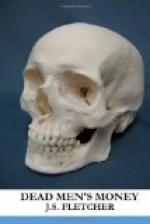CHAPTER IV
THE MURDERED MAN
There may be folk in the world to whom the finding of a dead man, lying grim and stark by the roadside, with the blood freshly run from it and making ugly patches of crimson on the grass and the gravel, would be an ordinary thing; but to me that had never seen blood let in violence, except in such matters as a bout of fisticuffs at school, it was the biggest thing that had ever happened, and I stood staring down at the white face as if I should never look at anything else as long as I lived. I remember all about that scene and that moment as freshly now as if the affair had happened last night. The dead man lying in the crushed grass—his arms thrown out helplessly on either side of him—the gloom of the trees all around—the murmuring of the waters, where Till was pouring its sluggish flood into the more active swirl and rush of the Tweed—the hot, oppressive air of the night—and the blood on the dry road—all that was what, at Mr. Gilverthwaite’s bidding, I had ridden out from Berwick to find in that lonely spot.
But I knew, of course, that James Gilverthwaite himself had not foreseen this affair, nor thought that I should find a murdered man. And as I at last drew breath, and lifted myself up a little from staring at the corpse, a great many thoughts rushed into my head, and began to tumble about over each other. Was this the man Mr. Gilverthwaite meant me to meet? Would Mr. Gilverthwaite have been murdered, too, if he had come there in person? And had the man been murdered for the sake of robbery? But I answered that last question as soon as I asked it, and in the negative, for the light of my lamp showed a fine, heavy gold watch-chain festooned across the man’s waistcoat—if murderously inclined thieves had been at him, they were not like to have left that. Then I wondered if I had disturbed the murderers—it was fixed in me from the beginning that there must have been more than one in at this dreadful game—and if they were still lurking about and watching me from the brushwood; and I made an effort, and bent down and touched one of the nerveless hands. It was stiffened already, and I knew then that the man had been dead some time.
And I knew another thing in that moment: poor Maisie, lying awake to listen for the tap at her window, so that she might get up and peep round the corner of her blind to assure herself that her Hughie was alive and safe, would have to lie quaking and speculating through the dark hours of that night, for here was work that was going to keep me busied till day broke. I set to it there and then, leaving the man just as I had found him, and hastening back in the direction of the main road. As luck would have it, I heard voices of men on Twizel Bridge, and ran right on the local police-sergeant and a constable, who had met there in the course of their night rounds. I knew them both, the sergeant being one Chisholm, and the constable a man named Turndale, and they knew me well enough from having seen me in the court at Berwick; and it was with open-mouthed surprise that they listened to what I had to tell them. Presently we were all three round the dead man, and this time there was the light of three lamps on his face and on the gouts of blood that were all about him, and Chisholm clicked his tongue sharply at what he saw.




